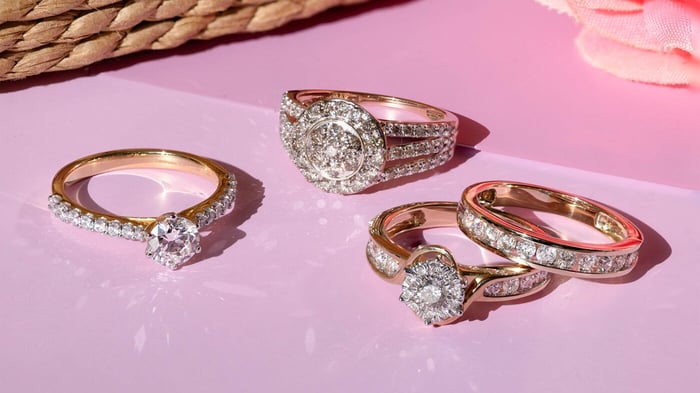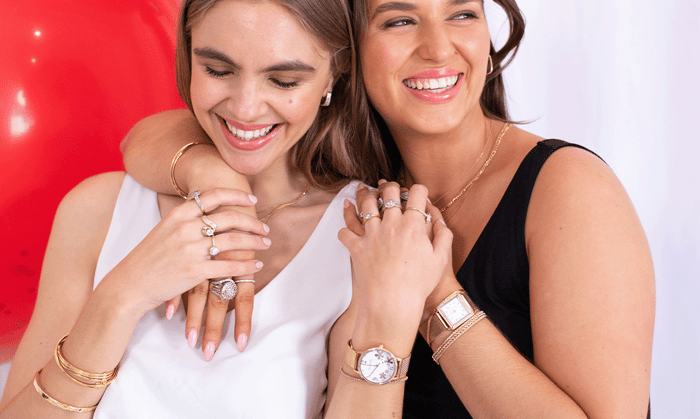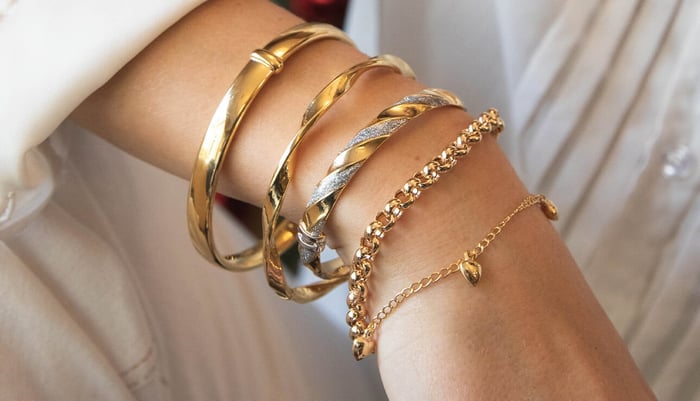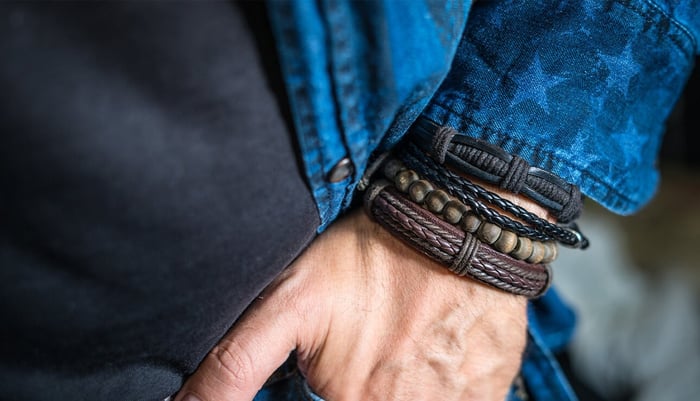They asked, you said yes and now you’re preparing for the big day. Arguably one of the biggest priorities, when you and your partner are planning your wedding, is your wedding rings. More than just another piece of jewellery in your collection, a wedding band symbolises the love and commitment that you and your spouse have for one another. They are also a reminder to those around you that you are off the market. People have been adorning these rings since the days of Ancient Rome, and while the designs have probably changed drastically since then and we now have access to the best metals for wedding bands, the sentiment has always remained the same.
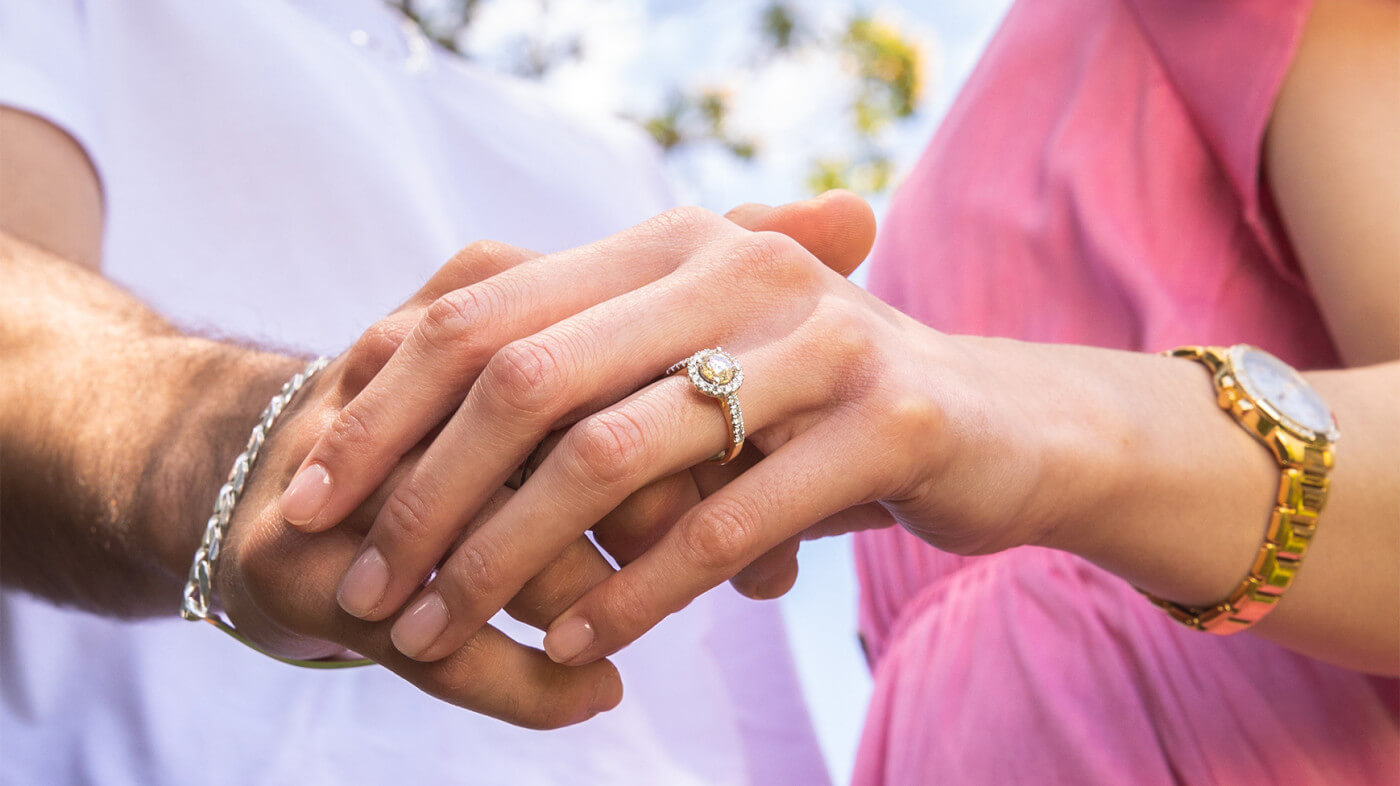
This is why wedding rings have always been seen as a very personal and well-thought-out purchase. There are so many things to consider when you and your partner pick out a wedding ring, including the thickness you want it to be, whether you want diamonds or engravings and most importantly, what type of metal you want it to be. The metal of your engagement ring is about so much more than aesthetics and what matches your engagement ring, it’s also about getting what fits in best with you and your lifestyle.
So, read on as we unpack the pros and cons of the best metals for wedding bands for this day and age so that you can find the one that’s right for you.
Overview:
The Five Best Metals for Wedding Bands
Choosing your bridal jewellery is no easy feat, especially as it is something you are potentially going to be wearing for the rest of your life. And therefore, isn’t something to be taken lightly. Particularly, when selecting the metal you want your wedding band to be. Selecting the ideal metal for your wedding band is a decision that’s not only based on aesthetics, it’s a reflection of you and your partner’s love story along with your personal style. Sure, when you’re the bride it’s very easy to just go with the piece that matches your engagement ring, however, that doesn’t necessarily equate to the most convenient choice.
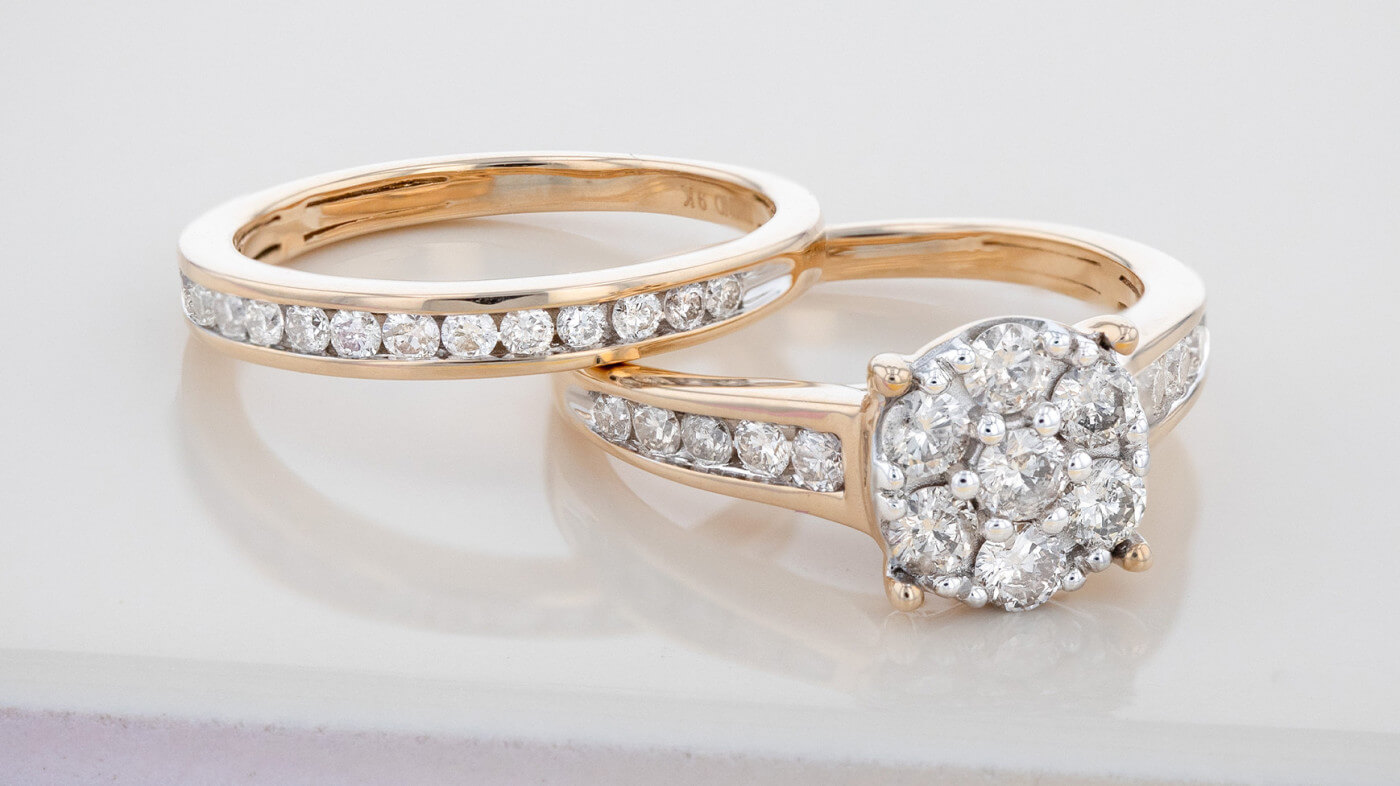
The five materials that are often regarded as the best metals for wedding bands are platinum, yellow gold, white gold, titanium and tungsten. While all of these metals are equally as stunning as the next, they each carry their very own distinct qualities that may dictate whether they are suitable to you and your lifestyle, so understanding their characteristics is crucial to your decision-making.
Platinum
Platinum is by far one of the most sought-after metals for wedding bands around today. Not only are platinum rings extremely luxurious, but they are also super slick and incredibly stylish. The metal’s natural white lustre and timeless appeal exude a sense of luxury, elevating the overall aesthetic of the ring. Platinum jewellery is also known for its remarkable durability and resistance to wear which makes it an excellent long-term investment. Moreover, platinum is a hypoallergenic metal meaning those who suffer from metal sensitivities and allergies can wear their wedding or eternity rings with ease. While choosing platinum as the metal for your wedding band does have its fair share of perks, like everything it also has some drawbacks.
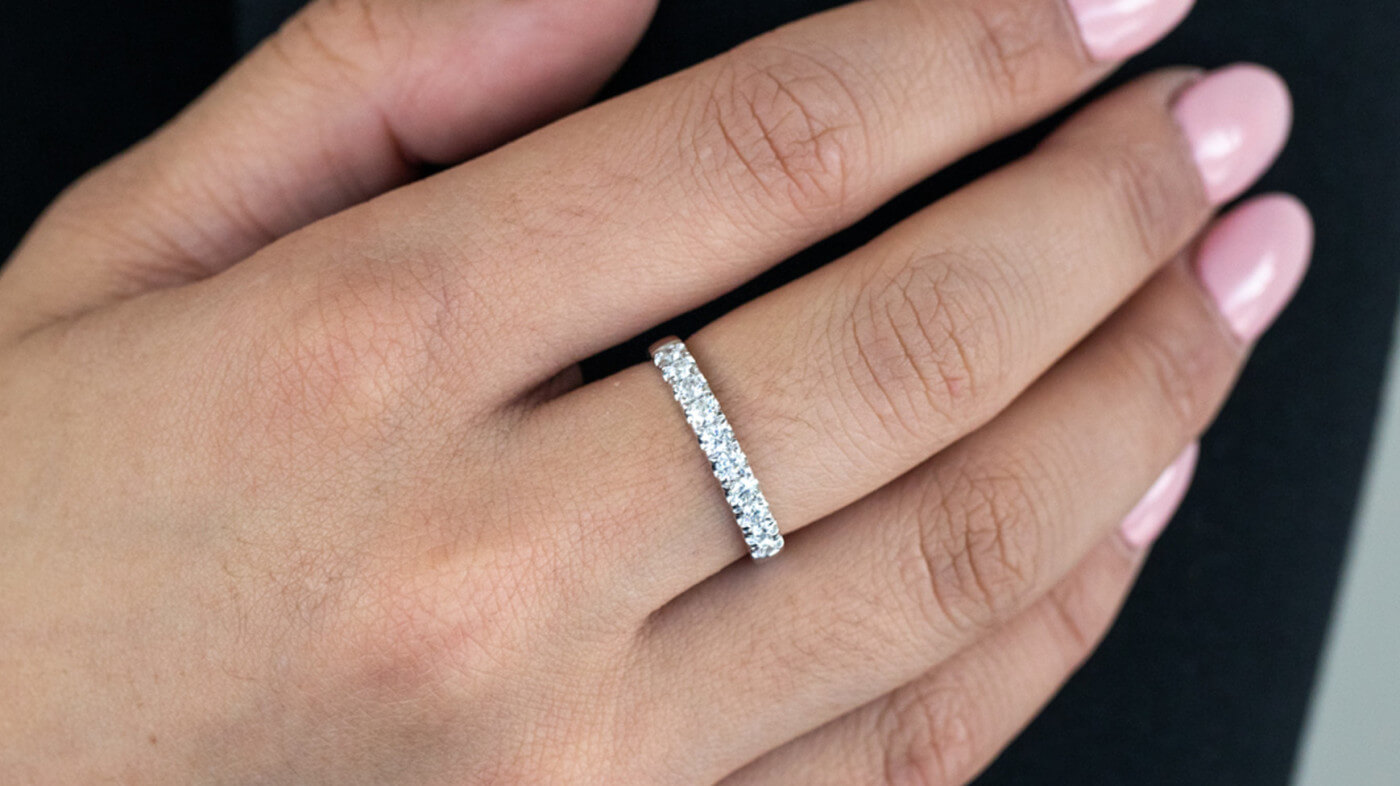
For one, platinum is lauded for its luxury factor, however, this also means that platinum has a much higher price point than many of the other metals used for wedding bands. Meaning it could be a no-go for budget-conscious couples who don’t want to spend an arm and a leg on their bridal set. Another potential drawback of this metal is its endurance. While platinum is relatively durable, it is a lot softer than other metals, which could leave it susceptible to scratches over time. Despite these drawbacks, however, the enduring beauty and symbolism of platinum make it a cherished choice for those who value both elegance and longevity in their wedding bands.
FLAWLESS CUT PLATINUM CLAW SET DIAMOND RING
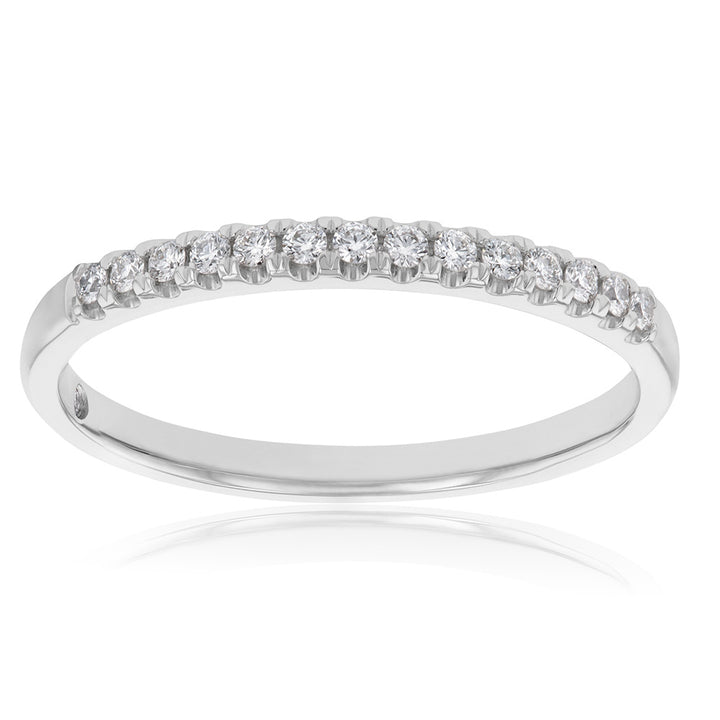
$699.00
Wear as a wedding band, eternity band or simply on it's own. A classic design with everlasting sparkle. Every diamond from the Flawless range has the beautiful pattern of hears and arrows which is a sign that your diamonds are… read more
FLAWLESS CUT PLATINUM 1/4 CARAT DIAMOND ETERNITY BAND
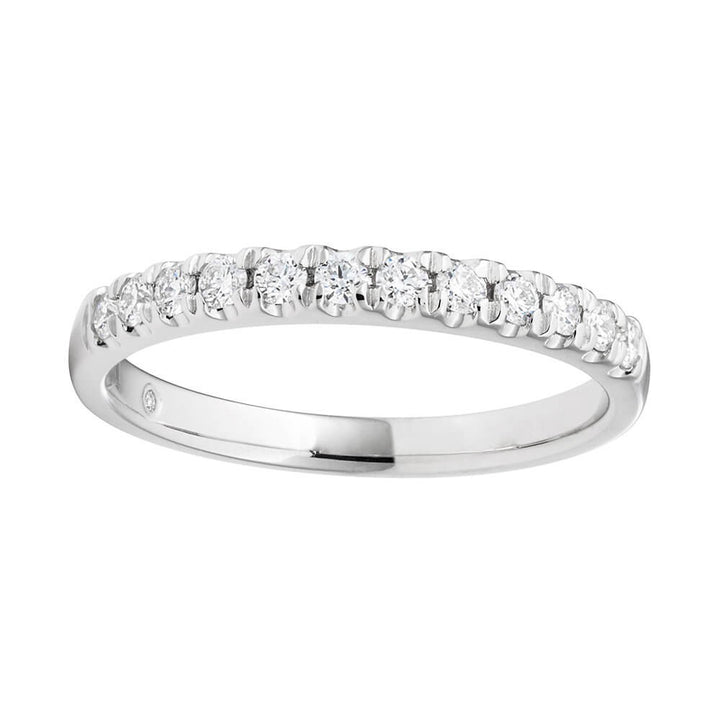
$1,049.00
Platinum Diamond Ring. Wear as a wedding band, eternity band or simply on it's own. A classic design with everlasting sparkle. Every diamond from the Flawless range has the beautiful pattern of hears and arrows which is a sign that… read more
FLAWLESS CUT PLATINUM 3/4 CARAT DIAMOND ETERNITY BAND
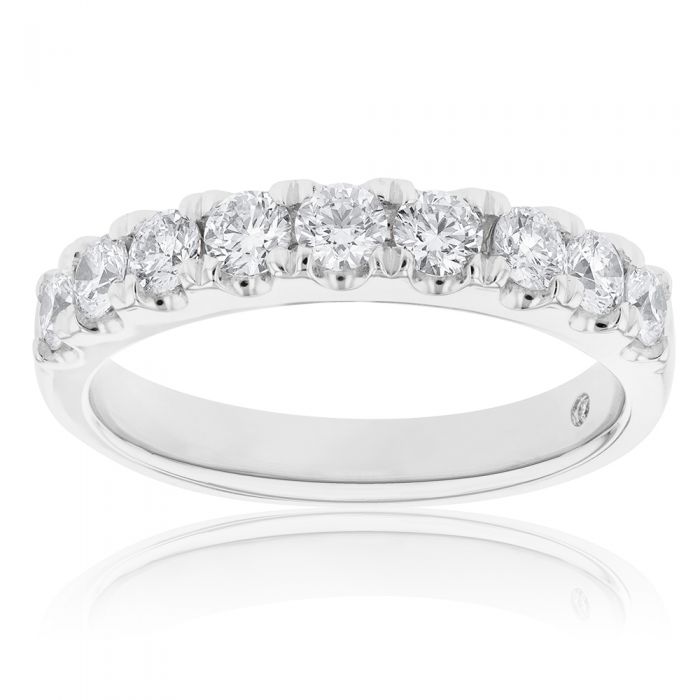
$2,374.00
Wear as a wedding band, eternity band or simply on it's own. A classic design with everlasting sparkle. Every diamond from the Flawless range has the beautiful pattern of hears and arrows which is a sign that your diamonds are… read more
Yellow Gold
Another popular option for wedding bands is yellow gold. Known for its timelessness and warm glow, yellow gold rings have been a symbol of luxury and elegance for centuries. With origins that stretch back to the days of Ancient Rome, gold rings exude a more traditional aesthetic compared to other metals and tones used for wedding bands, a lot of couples gravitate towards yellow gold for this reason. Yellow gold is also regarded as a hue that is complimentary towards most skin tones, particularly, warmer skin tones. Another benefit to choosing gold over the various other metals out there on the market is its malleability which makes it very easy to incorporate engravings into the band while also allowing for more intricate designs such as stone-set and pave diamond rings.
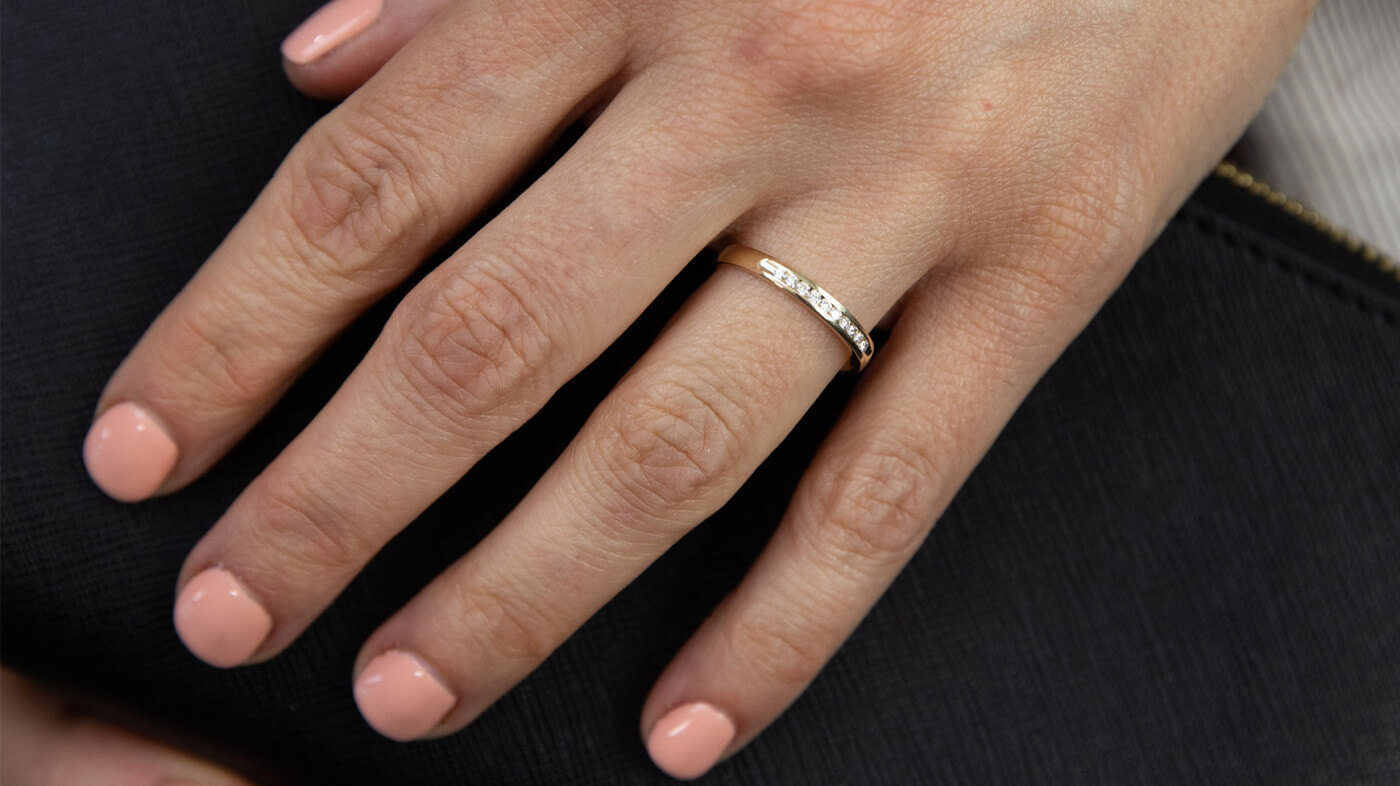
But while some people regard the malleability of yellow gold to be hugely beneficial, others consider it to be somewhat of a double-edged sword. Gold is one of the softer metals that you can use for a wedding band. It is so soft in fact, that it is frequently filled with other metals including silver and copper to help make it heavier and more durable while also providing gold with its carat grade. While these other metals (often known as alloys) do help substantially, gold is still more prone to scratches and dents compared to other metals used for wedding and eternity bands.
Read More: What Is The Difference Between 9ct And 18ct Gold?
9CT YELLOW GOLD 1/5 CARAT DIAMOND RING WITH 5 BRILLIANT 8 BAGUETTE DIAMONDS
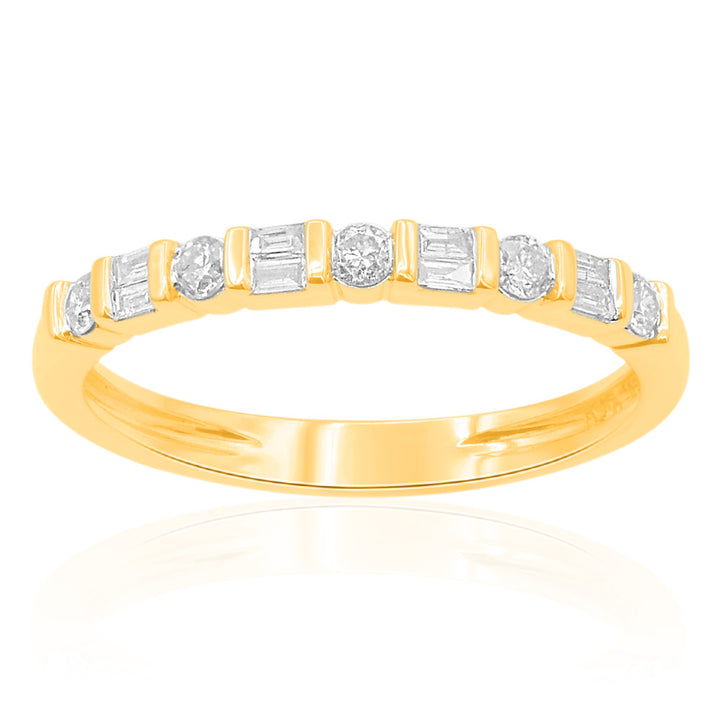
$999.00
9ct Yellow Gold 1/5 Carat Diamond Ring With 5 Brilliant 8 Baguette Diamonds… read more
9CT YELLOW GOLD 2.5MM HIGH DOME RING
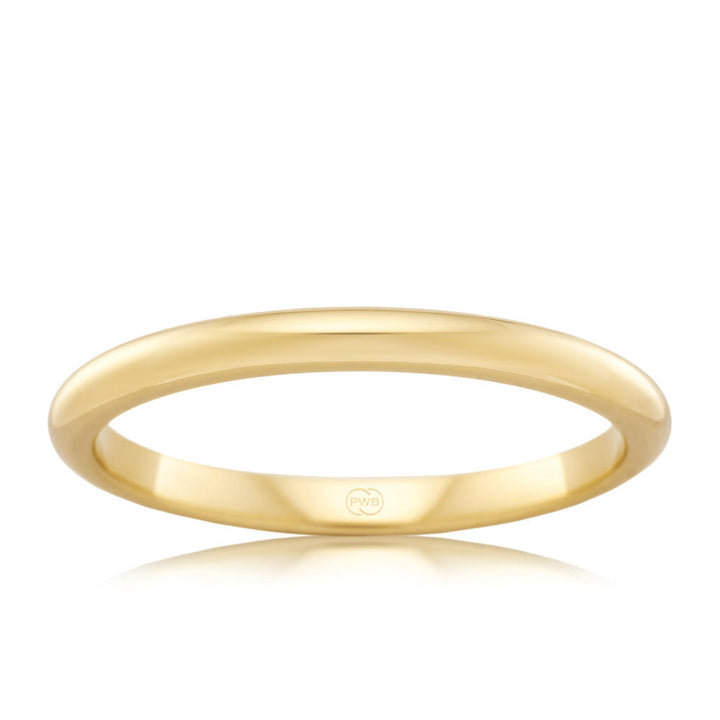
$699.00
This Australian made 9ct yellow gold band has a timeless design that comes in a 2.5mm high dome profile. While this ring can be worn as a classic wedding band it can also be worn as a piece of contemporary… read more
FLAWLESS CUT 18CT YELLOW GOLD DIAMOND RING WITH 15 DIAMONDS (TW-25-29PT)
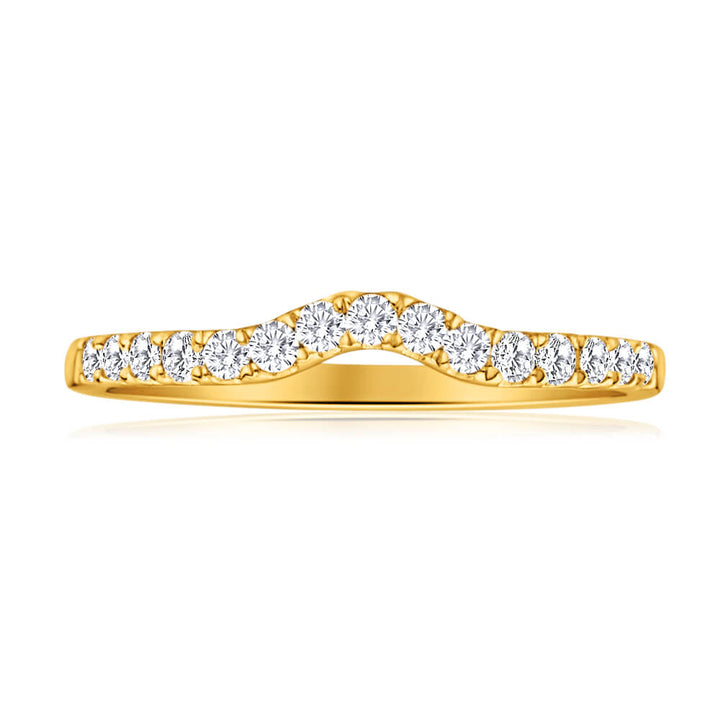
$698.00
This ring features a luxurious 18 carat yellow gold build that has been set with 15 flawless cut diamonds along the front edge. What makes these diamonds so special is that they have been expertly with precision and care to… read more
White Gold
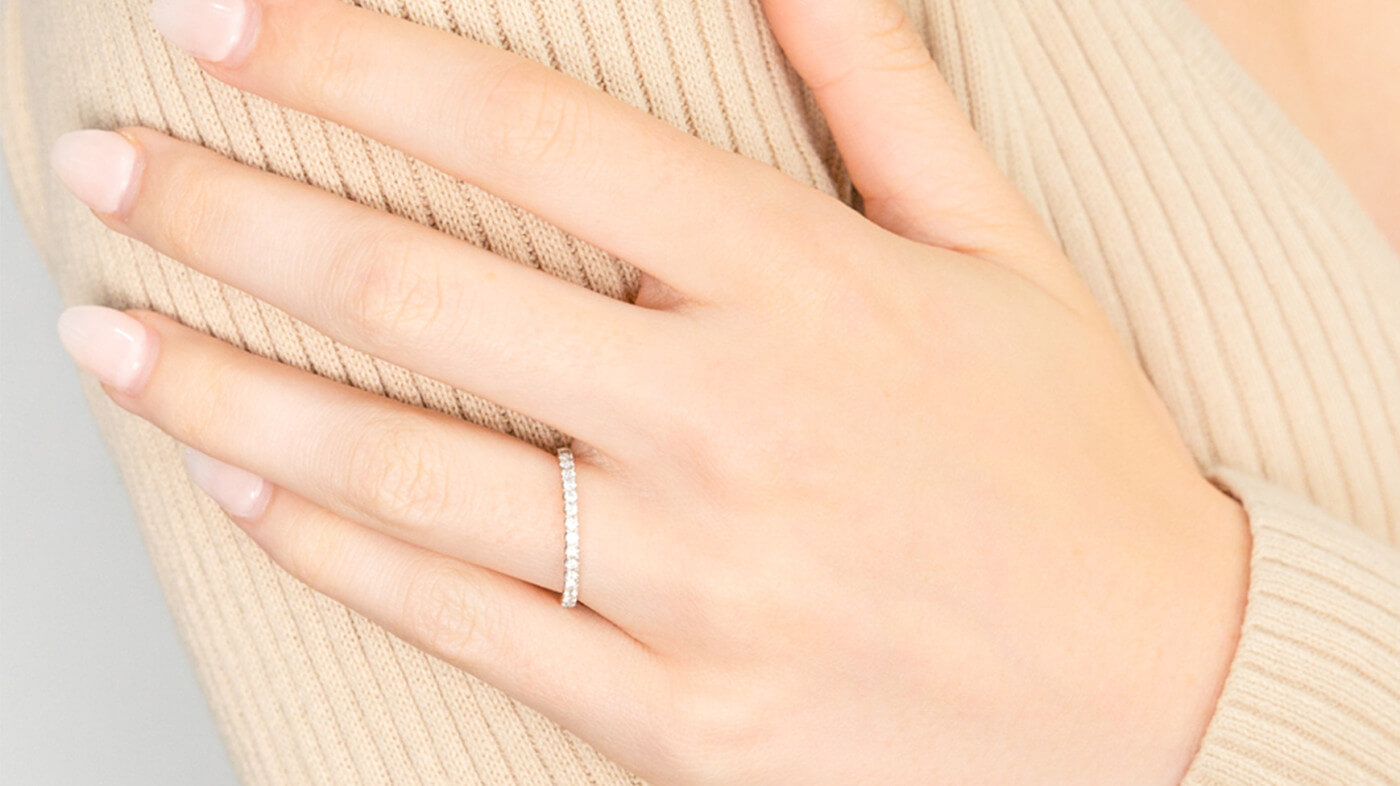
To achieve its signature white appearance, white gold jewellery is produced by combining silver, palladium, or nickel. This means that due to the high amount of nickel present, white gold jewellery is not considered to be hypoallergenic and therefore not suitable for those with a nickel allergy or metal sensitivity. Around 17% of people in the world suffer from nickel and metal allergies, something that can leave them susceptible to redness, itching, and swelling among other forms of discomfort when wearing jewellery that is unsuitable. Another element that may make you reconsider whether white gold is right for you is the fact that white gold jewellery is rhodium plated to ensure it maintains its quality and shine. This means you may have to get it re-plated every few years as the rhodium wears off, something that can be quite costly. By weighing its stunning appearance and durability against potential maintenance and sensitivity concerns, couples can make an informed decision on whether white gold is the perfect match for their wedding band.
MEMOIRE 18CT WHITE GOLD 1/5 CARAT DIAMOND ETERNITY BAND WITH 3/4 BAND OF DIAMONDS
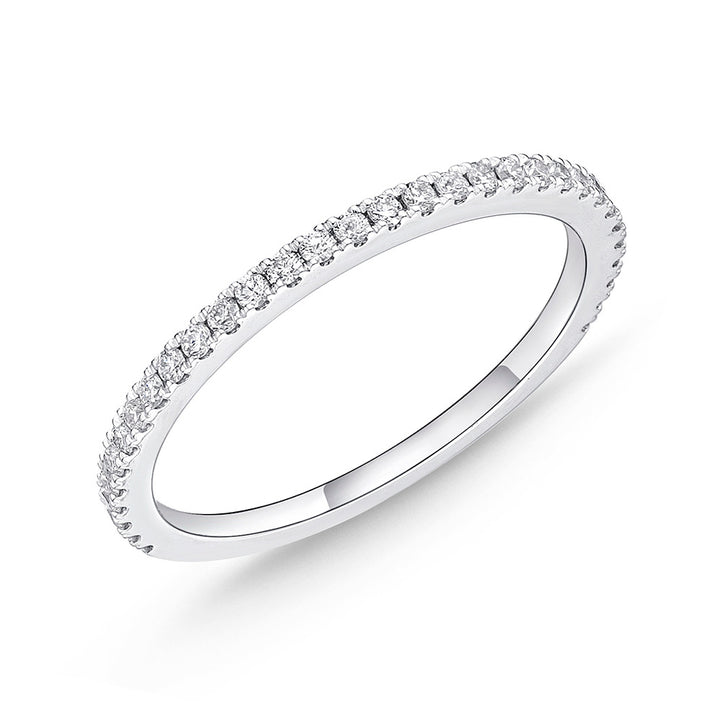
$726.00
This eternity ring from Memoire features a luxurious 18-carat white gold band that has been set with brilliant-cut diamonds along the front three-quarters of the band. The 18-carat white gold band pairs perfectly with the sparkle of the brilliant cut… read more
18CT WHITE GOLD 'EDEN' RING WITH 0.15 CARATS OF DIAMONDS
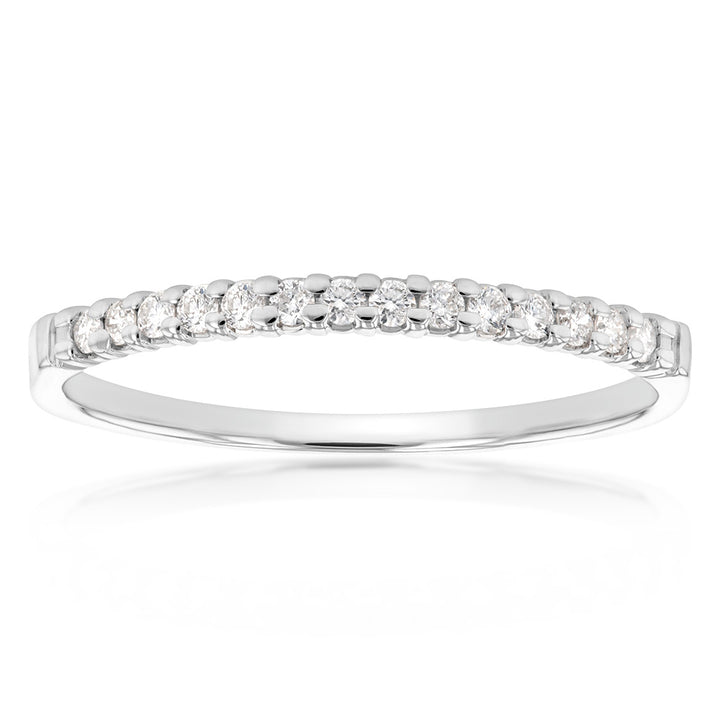
$1,869.00
This sparkling diamond ring features 14 brilliant cut diamonds in a claw setting. Crafted in 18ct white gold.… read more
9CT WHITE GOLD 3MM CLASSIC BARREL RING. SIZE P
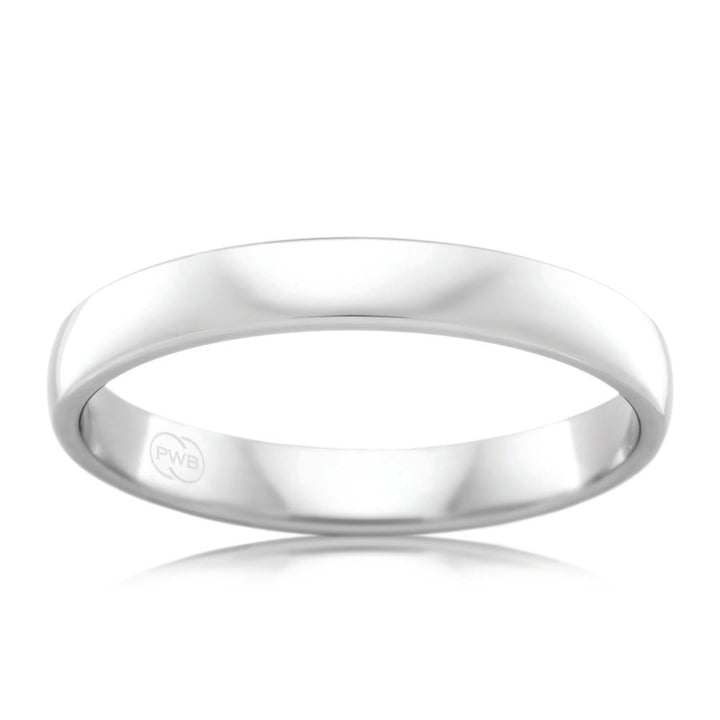
$899.00
This Australian made 9ct white gold band has a timeless design that comes in a 3mm barrel profile. While this ring can be worn as a classic wedding band it can also be worn as a piece of contemporary jewellery.… read more
Titanium
Arguably one of the lesser-known metals used for wedding bands, titanium is another option that couples can consider when making their selection. More commonly used for men’s wedding rings due to how accommodating it is for their significantly larger hands and fingers, titanium rings have a distinct look that is both contemporary and super stylish. Boasting exceptional durability and strength, titanium rings are an excellent choice for those that work relatively active lifestyles or work in a field that requires them to use their hands a lot as they are very resistant to corrosion, tarnishing, and scuffing and will not dent easily. But even with its toughness, Titanium jewellery is also very lightweight which makes it convenient for everyday wear. Another major benefit of choosing titanium as the metal for your wedding band is the fact that it is hypoallergenic and therefore completely safe for those that struggle with metal allergy and sensitivities.
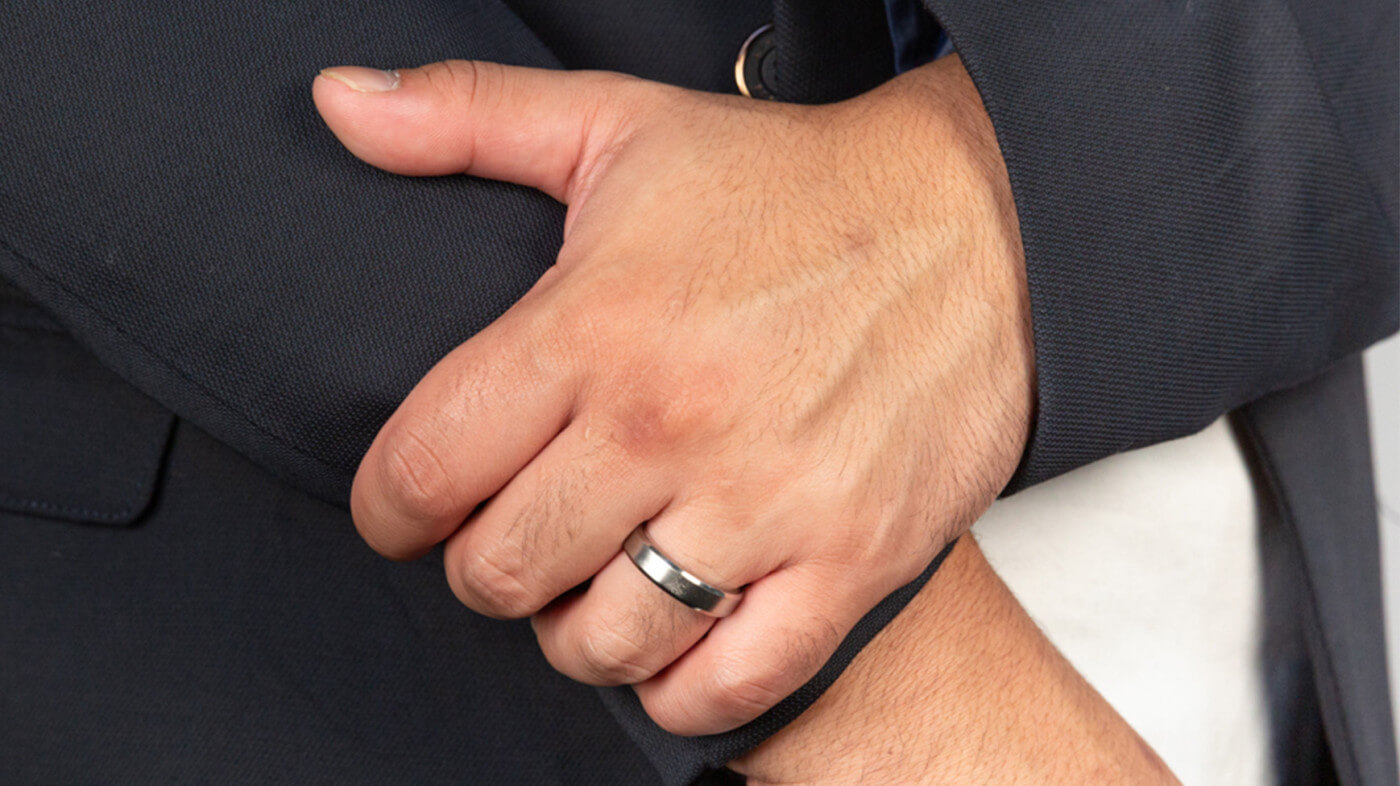
There are, however, some things you should be mindful of if choosing titanium as the metal for your wedding ring. While highly durable, titanium is not entirely scratch-proof and may develop some minor hairline scratches over time. Another potential drawback is that its inherent strength can make resizing a challenge, meaning that it is crucial that you get your size right and the time of purchasing. And if you are someone whose fingers fluctuate due to the heat or even weight gain, you may need to be prepared to purchase a whole new ring or not wear it all the time. Additionally, due to its toughness and unique properties, titanium cannot be soldered like other metals, limiting both potential design alterations and engravings. Striking a balance between its robustness and design limitations is essential if you are choosing titanium for your wedding ring, especially considering its unmatched strength and modern aesthetic.
FLAWLESS CUT HALF ROUND POLISHED / SANDED TITANIUM 6MM RING
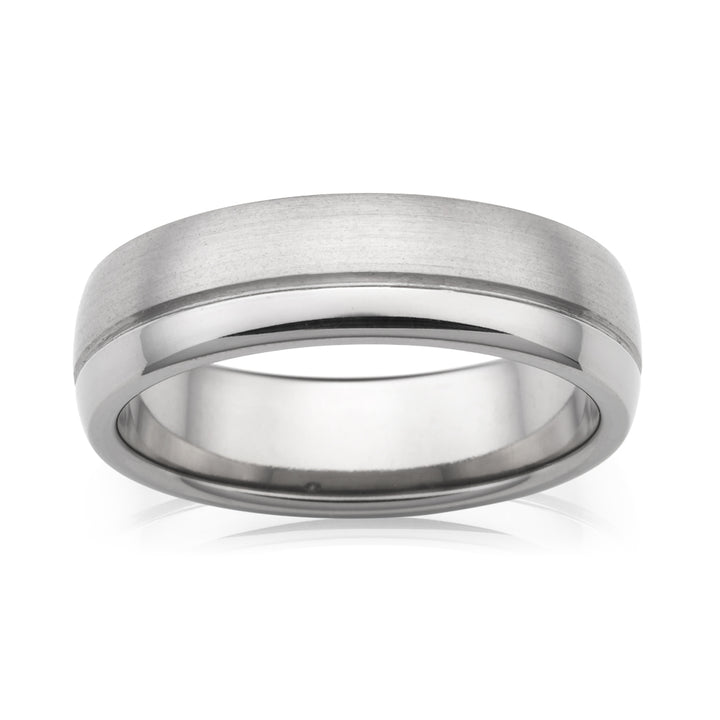
$190.00
A traditional mens ring, this Flawless Cut Half Round Polished / Sanded Titanium 6mm Ring is minimalistic yet striking. Finished in brushed titanium, the ring has a masculine and bold feel. An envious wedding band, elevate your confidence in this… read more
FLAWLESS CUT 9CT YELLOW GOLD & TITANIUM 7MM RING
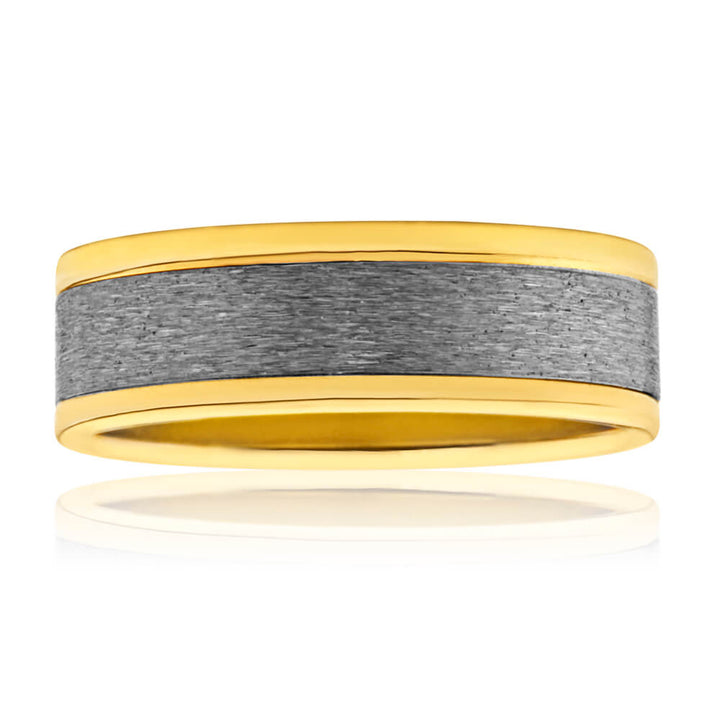
$514.00
This stunning gents wedding ring is sure to make a statement. Featuring titanium and 9ct gold, the ring will last a lifetime.… read more
FLAWLESS CUT TITANIUM 5MM RING
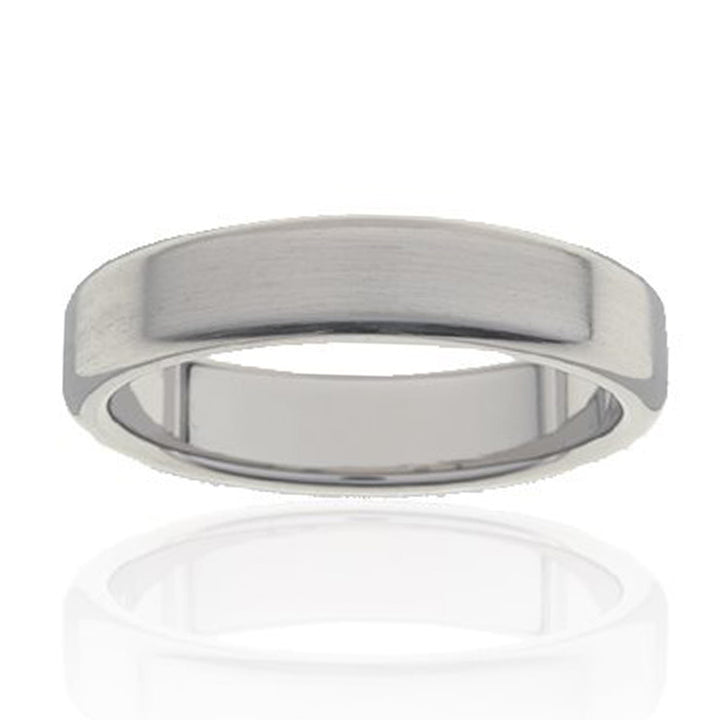
$118.00
This Flawless Cut Titanium 5mm Ring is a classy minimalist ring to wear anywhere you go. Titanium is a highly popular jewellery material for its strength, durability and light weight. The metal's colour has a rich appeal, and looks even… read more
Tungsten
Perhaps the rarest of the bunch in terms of usage in wedding rings, tungsten is a rare metal known for its striking black, charcoal exterior. Renowned for its sturdiness and strength, tungsten is relatively resistant and scratches and genuine wear, ensuring that it maintains its sleek appearance over time. Tungsten's natural dark colour exudes a modern and masculine appeal, making it ideal for those that want a wedding ring that feels a little more contemporary and less like a traditional wedding band. Meanwhile, its affordability compared to precious metals is an attractive feature for budget-conscious couples. However, there are certain factors to keep in mind if you are considering a tungsten ring.
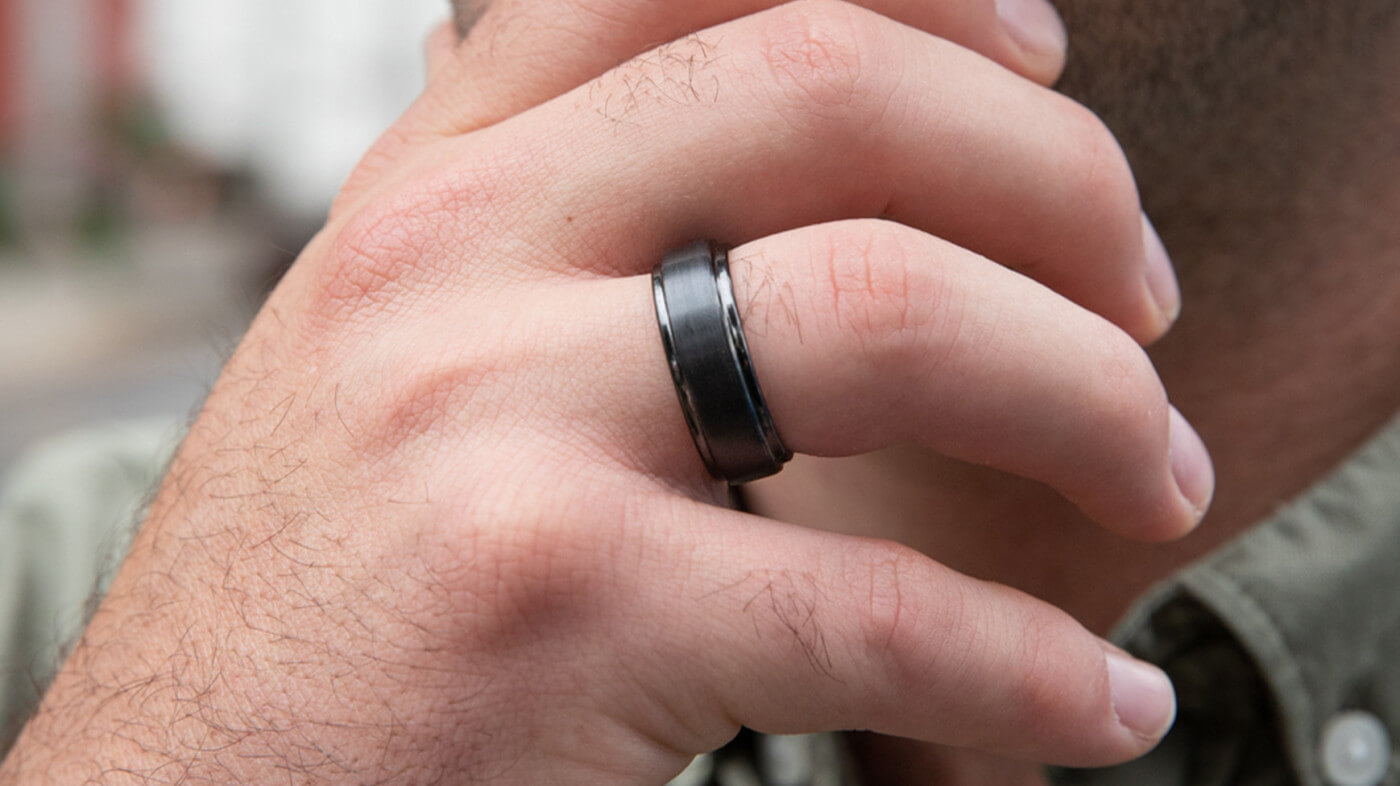
Much like titanium rings, tungsten rings cannot be resized due to their hardness. This makes it essential that you maintain accurate sizing from the start as getting the wrong size could be a costly operation. While tungsten jewellery is quite sturdy and durable, it is also very malleable and can become brittle after too many knocks or bumps. And even though tungsten jewellery is quite scratch-resistant, it’s not necessarily completely scratch-proof, and in some cases, a patina may develop over time. When considering a tungsten wedding band, it’s all about weighing up your priorities especially when it comes to elements such as durability, strength and style limitations. Although, this metal is definitely valued for its unique strengths and contemporary look.
FORTE TUNGSTEN 8MM RING
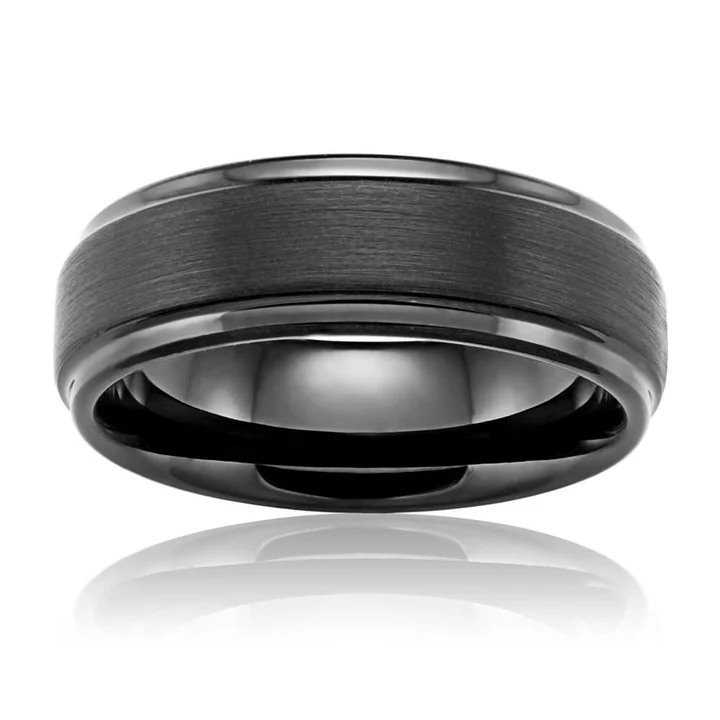
$39.99
$99.99
This beautiful man’s ring has a black dual-tone finish that stands out on his finger. The simple design makes it easy to wear even for a man just beginning to embrace jewellery. Suiting all outfits the minimalist design can be… read more
TUNGSTEN GREY CENTRE GENTS RING
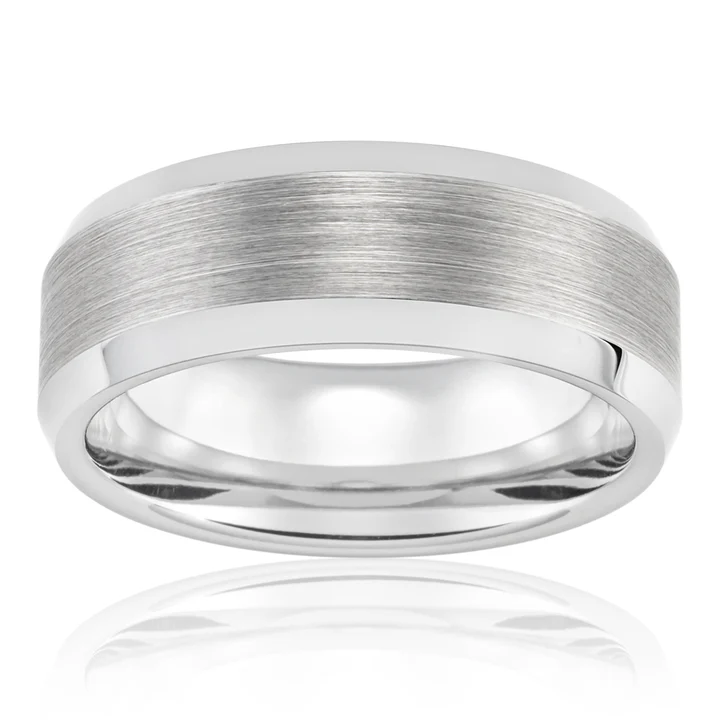
$79.99
Simple and stylish, this Tungsten Grey Centre Gents Ring is perfect for the everyday man. Crafted in shiny tungsten, the ring is durable and sturdy with a reflective finish that is versatile for everyday wear. The ring also is complete… read more
TUNGSTEN BLACK POLISHED CENTRE GENTS RING - *NO RESIZE*

$39.99
$99.99
This classy tungsten ring has a dark, refined look ready to pair with formal or casual wear. Tungsten is 10x stronger than high-end gold rings, so you won't ever have to worry about bending or scratching.… read more
You May Also Like:
- Say 'I Do' To The Jewellery Gift: What To Buy For A Bride To Be
- Bridal Jewellery Trends 2023
- Our Best Round Engagement Rings
- Best Gemstone Engagement Rings
- A Selection Of Our Best Princess Cut Engagement Rings
- A Roundup Of Our Best Solitaire Engagement Rings
- Men's Engagement Ring Ideas
- Reflecting On Our Best Emerald Cut Engagement Rings

